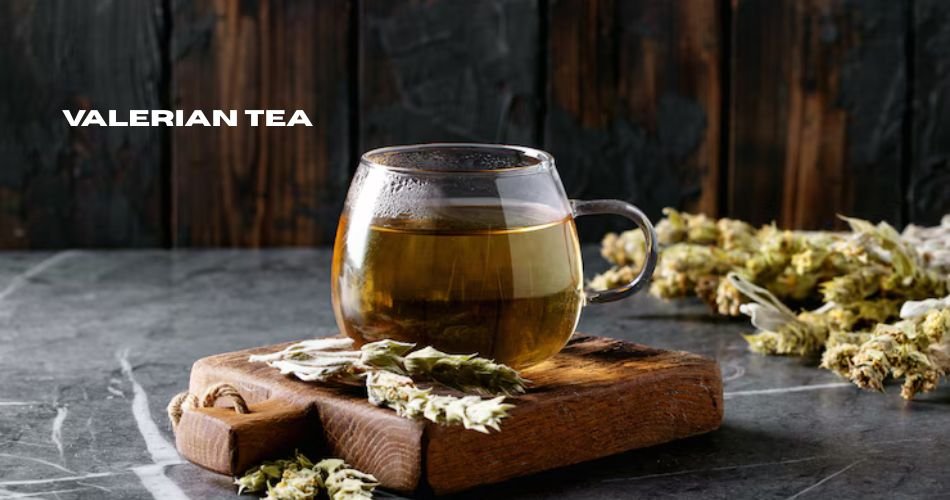Valerian tea is a traditional herbal beverage made from the dried roots of the Valeriana officinalis plant, widely recognized for its calming and sedative effects. Used for centuries in Europe and Asia, valerian tea has been a natural solution for people suffering from insomnia, anxiety, nervous tension, and restlessness. Its distinctive earthy aroma and strong, bitter taste may be off-putting at first, but its remarkable health benefits have earned it a permanent place in the world of natural wellness. As a bedtime drink or a stress-relieving infusion, valerian tea holds the key to gentle and effective relaxation.
The Herbal Science Behind Valerian Tea
The magic of valerian tea lies in its bioactive compounds such as valerenic acid, isovaleric acid, and various antioxidants. These natural chemicals work together to interact with gamma-aminobutyric acid (GABA) receptors in the brain, which are responsible for calming nervous activity. By increasing GABA availability, valerian root naturally induces a state of tranquility. Unlike pharmaceutical sedatives, valerian tea works gradually and gently, making it suitable for long-term use without the risk of dependency or harsh side effects. This neurological influence explains why the tea is so effective in promoting deep sleep and easing psychological stress.
Valerian Tea as a Natural Sleep Enhancer
One of the most celebrated benefits of valerian tea is its ability to enhance sleep quality. For those battling insomnia or disturbed sleep cycles, this herbal remedy provides a non-addictive alternative to synthetic sleep aids. Drinking valerian tea about 30 minutes before bed helps reduce the time it takes to fall asleep, improves the duration of deep sleep, and allows for a more restful night. It helps people wake up feeling refreshed, without the morning drowsiness that often accompanies over-the-counter sleep medications. Incorporating valerian tea into a nightly routine can become a soothing ritual that signals the body it’s time to wind down.
Combatting Stress and Anxiety with Valerian Tea
Modern life brings a constant bombardment of stressors that can leave us feeling overwhelmed and anxious. Valerian tea acts as a herbal balm for the nervous system, calming the mind and reducing physical symptoms of anxiety such as racing thoughts, muscle tension, and rapid heartbeat. The relaxing effects of the tea are particularly helpful for people who experience stress before public speaking, social events, or during high-pressure situations. It promotes a sense of peace and balance that makes daily challenges feel more manageable, helping users stay focused and emotionally grounded even during turbulent times.
Daily Use and Ideal Consumption Practices
Valerian tea should be consumed thoughtfully to experience its full benefits. It is typically taken once a day, usually in the evening, to prepare the body for restful sleep. For stress relief, a small cup in the morning or early afternoon may be helpful, but overuse during daytime hours might lead to unwanted drowsiness. A recommended dose is one teaspoon of dried valerian root steeped in a cup of hot water for 10 to 15 minutes. Consistent use over a period of one to two weeks often yields the best results, as the compounds in valerian accumulate and build up their effectiveness in the body over time.
Blending Valerian with Other Soothing Herbs
While valerian tea is effective on its own, blending it with other calming herbs can enhance its flavor and boost its therapeutic effects. Popular pairings include chamomile, lemon balm, lavender, and passionflower. Chamomile and lemon balm provide a sweeter, more pleasant taste that balances valerian’s strong, musky flavor, while lavender and passionflower deepen the tea’s ability to relax both the body and mind. These herbal combinations can be custom-blended at home or purchased in pre-formulated tea bags from reputable wellness brands, offering both convenience and comfort in one soothing cup.
Valerian Tea and Mental Health Support
In addition to promoting sleep and reducing stress, valerian tea may also support mental clarity and emotional well-being. When anxiety and insomnia are left unaddressed, they often lead to foggy thinking, irritability, and poor concentration. By promoting better sleep and easing mental tension, valerian tea indirectly enhances cognitive function and emotional resilience. It can serve as a gentle aid for people dealing with mood disorders, especially when used alongside healthy habits like exercise, mindfulness, and proper nutrition. Though not a cure-all, valerian tea contributes to a more balanced and centered state of mind.
Precautions and Side Effects to Consider
Despite its natural origins, valerian tea should be consumed with care. Some users may experience mild side effects such as dizziness, stomach discomfort, or headaches, especially when consumed in high quantities. It is not recommended for pregnant or nursing women, children, or individuals taking sedatives, antidepressants, or anti-seizure medications without prior medical consultation. Additionally, users should avoid alcohol and refrain from driving or operating heavy machinery after drinking valerian tea due to its sedative effects. Listening to your body and starting with a lower dosage can help minimize unwanted reactions.
Comparing Valerian Tea to Conventional Sleep Aids
Valerian tea offers a gentle, non-addictive alternative to prescription and over-the-counter sleep aids. Unlike pharmaceutical sedatives, which often come with risks of dependency, withdrawal symptoms, and daytime drowsiness, valerian tea supports the body’s natural sleep rhythms. It nurtures rather than overrides the nervous system. While sleep medications often force the body into a state of rest, valerian tea encourages the body to relax on its own terms. This makes it especially valuable for people seeking a long-term, sustainable solution for sleep difficulties without the side effects and risks of stronger medications.
How to Choose High-Quality Valerian Tea
The effectiveness of valerian tea greatly depends on the quality of the herb used. Consumers should look for organic valerian root that is free from additives, artificial flavors, or chemical pesticides. The most potent form is loose-leaf dried root, which allows for control over strength and freshness. However, for convenience, valerian tea bags from trusted herbal brands like Traditional Medicinals or Yogi can also deliver great results. Pay attention to the aroma—true valerian has a very strong, almost pungent earthy smell. If your tea lacks this scent, it may be stale or diluted.
Storing and Preserving Valerian Root Tea
To maintain the strength and freshness of valerian tea, proper storage is essential. Keep the dried root or tea bags in an airtight container, away from direct sunlight, moisture, and strong odors. A dark cupboard or pantry is ideal. When stored properly, dried valerian root can remain potent for up to two years. Tea bags, while convenient, typically have a shorter shelf life and should be used within the “best by” date printed on the package. Always inspect the tea before brewing—if it smells weak or musty, it’s likely lost its efficacy.
Cultural and Historical Use of Valerian Tea
Valerian’s reputation as a healing herb dates back thousands of years. Ancient Greeks, including Hippocrates, noted its calming effects, while Galen prescribed it for insomnia and nervousness. In medieval Europe, valerian root was not only used medicinally but was also considered a magical herb believed to ward off evil. During World War II, it was given to civilians in England to help cope with the stress of air raids. Today, it continues to be a symbol of natural healing, revered for its enduring effectiveness in easing the burdens of modern life.
Scientific Backing of Valerian’s Efficacy
Numerous clinical studies have validated the calming and sleep-enhancing effects of valerian root. Research published in journals such as Phytomedicine and the American Journal of Medicine has shown significant improvements in sleep latency and overall quality of sleep among subjects who used valerian root. Some studies suggest that valerian’s effects are comparable to mild tranquilizers, but without the associated risks. However, results can vary from person to person, and researchers emphasize the importance of continued study to understand dosage, long-term effects, and interactions with other substances.
Valerian Tea in Holistic Wellness
Valerian tea fits seamlessly into a holistic lifestyle that values natural healing, stress management, and mental clarity. Whether used alone or in conjunction with practices like yoga, meditation, journaling, or aromatherapy, valerian tea can serve as a grounding force. Its soothing effects support not just better sleep, but a more mindful, relaxed approach to life. For those seeking harmony between body and mind without reliance on pharmaceuticals, valerian tea is a simple, time-tested solution that bridges tradition with modern wellness philosophies.
Final Thoughts on Embracing Valerian Tea
Valerian tea is a herbal treasure that brings calm, sleep, and mental balance in a world that often feels chaotic and overstimulated. With its deep roots in traditional medicine and growing scientific support, valerian remains a beacon for those who seek to improve their well-being naturally. Drinking this tea isn’t just about physical relaxation—it’s a mindful pause, a nightly ritual, and a signal to your nervous system that it’s okay to let go. For anyone who wants to sleep more deeply, live more peacefully, and cope more gracefully with stress, valerian tea is a gentle but powerful ally.






